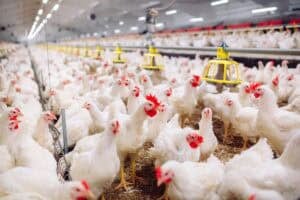Hopes for a scientific decision on the introduction of anti-dumping duties.

The local poultry industry feels “abandoned” by government because of the lack of protection against the dumping of considerably cheaper chicken products, particularly from Brazil.
Currently, the landed cost of imports from Brazil amounts to R9 per kilogram, while the producer price in South Africa is R30.50. “The industry does not need protection from imports, we need protection from dumping,” says Izaak Breitenbach, general manager of the South African Poultry Association (Sapa).
The International Trade Administration Commission (Itac) recommended the implementation of final anti-dumping duties against Brazil, Denmark, Ireland, Poland, and Spain. Minister of Trade, Industry and Competition Ebrahim Patel suspended the implementation for 12 months, citing the potential impact on food prices as the reason. The suspension ends this month.
ALSO READ: Poultry association rejects call for suspension of tariffs on chicken imports
Best for SA
Despite promises that he would consult with industry players before making his decision on the implementation, there has been no meeting with the minister as yet, says Breitenbach.
“The minister must do what is best for South Africa. It is absolutely within his right to withhold the anti-dumping duties recommended by Itac, although it may have some far-reaching consequences for the local poultry industry,” he said during a discussion on a study done by Genesis Analytics on the impact of anti-dumping duties on chicken prices.
“We are looking forward to a scientific decision with all the facts on the table.”
Breitenbach says they do not need protection from imports, but they need protection from dumping.
“Imports keep prices down, but dumped chicken decimates the industry.”
Both Sapa and the Association of Meat Importers and Exporters (Amie) this week published lengthy reports on the impact of anti-dumping duties on food security, food inflation and trade relations with key trading partners.
ALSO READ: Anti-dumping duties on chicken imports a win for local poultry farmers
Burden on consumers
Tutwa Consulting, on behalf of Amie, said in its report the Most Favoured Nation (MFN) duty rate on bone-in chicken portions had already increased from 37% in March 2020 to the current rate of 62%.
“The proposed reinstatement of anti-dumping duties would compound the burden on consumers. It is suggested that the South African government consider revising the MFN duty rate downwards, alongside the long-term suspension (or elimination) of anti-dumping duties. Such measures would contribute to a more balanced and consumer-friendly trade environment,” the report stated.
Sapa’s Breitenbach says there are ample arguments in favour of the introduction of the final anti-dumping duties. Their report in essence argues that assumptions about the impact of anti-dumping duties on local chicken prices are overstated.
Andre Frauenknecht, principal in the competition and regulatory economics practice of Genesis Analytics and co-author of the report, says they found, based on the higher provisional duties, that the cheapest chicken (individually quick frozen 2kg bags) could increase by between 2.5% and 4.5%.
It has been suggested that the duties could increase the price of chicken in SA by around 30%.
“One can unequivocally say that even if all imports came from the five targeted countries and there was a 50% duty levied (on average) that it cannot and never will translate into an increase of 30% in the retail price,” says Frauenknecht.
ALSO READ: Chicken dumping tariffs on ice, to help ease price burden on consumers
Free-on-board price
He points to the fact that the anti-dumping duty is levied on the free-on-board price, which is “but a portion of the retail price”. In 2022 the average price of individually quick-frozen chicken in SA was around R43.
As an example, if the free-on-board price is 38% of the final retail price and a duty of 30% is levied, the maximum “markup” is 10.76%.
“That is assuming that every single import is coming from the country on which the duty is applied,” says Frauenknecht.
In 2019 the five targeted countries (Brazil, Denmark, Poland, Ireland and Spain) imported 60% of the bone-in frozen chicken. This figure halved in 2022. “The diluting factor (on price increases) is that a lot more imports are coming from countries on which the anti-dumping duties are not applicable.”
ALSO READ: Poultry association rejects call for suspension of tariffs on chicken imports
Price control
The Amie report refers to the Poultry Master Plan, which emphasises the importance of protecting and growing the domestic poultry industry while acknowledging the significance of imports in maintaining a balanced sector.
“Imports are recognised as essential for price control, meeting demand for non-domestic poultry products, and addressing local supply shortages. Imposing restrictions on imports would contradict the plan’s objectives and jeopardise current and future consumption,” it says.
Breitenbach notes that food security is not only about the availability of the product but also about price. If there is a global shortage of chicken, local prices rise as imports will drop. “The point is that local production makes countries food secure and ensures long-term low prices.”
This article originally appeared on Moneyweb and was republished with permission.
Read the original article here.
Support Local Journalism
Add The Citizen as a Preferred Source on Google and follow us on Google News to see more of our trusted reporting in Google News and Top Stories.








